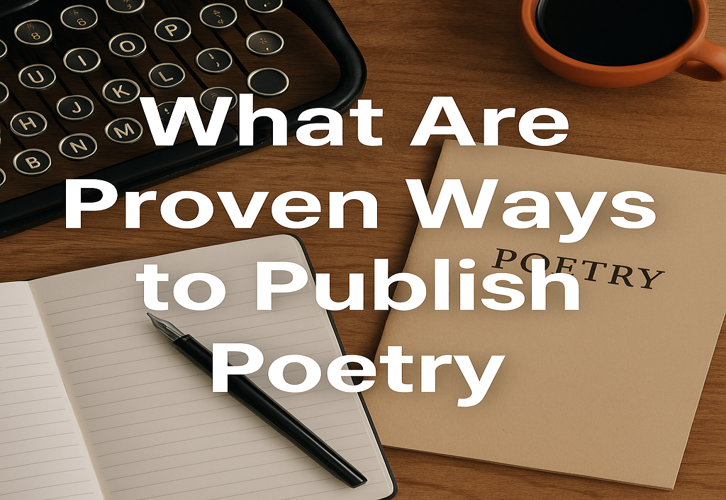Years ago, I scribbled poems in a notebook, dreaming of seeing them in print. The idea of sharing my words felt thrilling but overwhelming. Where do you even start? Today, countless poets face that same question. This guide breaks down practical steps to publish poetry, drawn from real-world experience and current trends. Let’s walk through options that can help your verses find an audience.
How Can You Publish Poetry in Literary Magazines?
I began submitting poems to magazines, but received no response. Literary magazines remain one of the most established ways to publish poetry and gain recognition. Finding things out beforehand is important. Begin by locating magazines you enjoy. Sites such as Duotrope, or Chillsubs, show many places to submit your work. They detail submission preferences, also reveal open dates. Look at old copies, they are usually available on the internet, to understand what they like. Craft a brief cover letter, perhaps just a few sentences, to explain your reason for applying with this company. Tell them what interests you about their work. Show you did some research, it demonstrates genuine enthusiasm. Pick four or five poems that fit their tone and follow their rules to the letter. Wait times can drag, sometimes three months or more. Rejections sting, but they’re part of the game. Keep sending, tweaking as you go, and soon enough, an acceptance might land.
Why Should You Consider Poetry Contests?
Contests can feel like a long shot, but they’re worth a try. I entered a small one once, didn’t win, but got a kind note from a judge that kept me going. Check trusted sources like Poets & Writers for listings. Most ask for a small fee, so pick ones with clear reputations. Winning means bragging rights and sometimes a cash prize. Even placing your poem in an anthology. Smaller contests are less competitive, so start there. Read the fine print to avoid scams. Some have themes, which can push you to write something new. A win or honorable mention beefs up your bio for later submissions. It’s a chance to shine and learn.
Is Self-Publishing a Good Fit for Your Poetry?
I know poets who swear by self-publishing as their preferred way to Publish poetry because it’s all on their terms. You can use platforms like Amazon’s Kindle Direct Publishing to get your book out fast. You handle the cover, layout, everything, or pay someone to make it look sharp. The catch? You’re the marketing team. Post snippets on Instagram or TikTok to build a following first. Crowdfunding can cover printing costs if you want physical copies. It’s perfect if you want your work out now, not in two years. Sales depend on how much you hustle. Some poets mix this with traditional publishing to reach more readers. It’s freedom, but it takes work to get noticed. Want to read more about publishing poetry? Read this.
Where Can You Share Poems Online for Feedback?
Online platforms are a game-changer for poets. I started posting on a blog years back, nervous but curious. Sites like Medium or even a free WordPress page let you share work easily. Submittable helps you apply to tons of journals in one go. Join forums like Reddit’s poetry groups to swap critiques with strangers who get it. Online lit mags offer another accessible route to publish poetry, and many are free to submit to while always hunting for fresh voices. Share a poem, ask for thoughts, and watch what clicks with readers. It’s a low-risk way to test your stuff. Plus, comments and shares can spread your name faster than you’d think.
How Do Workshops and Readings Help You Get Published?
I went to a poetry class in town, it completely shifted how I saw things. Listening to people read my writing helped me find the spots I needed to improve. Find classes at libraries, schools, or websites such as The Poetry Barn. You can test your poems with people at open mic events in coffee shops, or by reading them online. You will connect with people who edit books, write poems, perhaps run their own publishing companies. Bring business cards with your website or email. Feedback from these events sharpens your craft. Plus, connections you make might lead to a journal editor saying, “Send me something.” It’s about showing up and being part of the scene.
Why Does a Publication Record Matter?
Showing you can deliver takes work, yet it’s really important. Getting my first poem published in a small website felt wonderful, like a huge accomplishment. Begin by submitting poems to magazines, then consider a complete collection. Building this foundation is crucial when you want to publish poetry in more prestigious venues later. Make a basic list to note where you submit your projects, together with the dates. You face many setbacks, yet each experience offers a lesson. Make changes using suggestions from others. Little achievements build a strong work history, helping you get opportunities. People in the book world, like agents or publishers, feel good knowing others have already checked your work.
How Does Networking Open Doors for Poets?
I met an editor at a reading who later published my work, all because we chatted over bad coffee. Networking isn’t schmoozing; it’s connecting. Join local poetry groups or online ones on X or Discord. Follow poets and editors on social media, comment on their posts, share their work. Attend book launches or literary festivals, even virtually. Be real, not pushy. Relationships can lead to tips on open calls or personal invites to submit. It’s not a guarantee, but it’s like planting seeds. One conversation might bloom into an opportunity down the line.
What Goes Into a Winning Submission Package?
A good submission package is your handshake. I used to send messy ones, and surprise, they flopped. Now, I keep it tight: a bio with any past publications, a cover letter that shows I’ve read the journal, and poems that match their vibe. Format cleanly, no weird fonts. Check their guidelines twice; some want PDFs, others Word docs. Pick poems that feel cohesive, maybe around a theme. Proofread until your eyes hurt. A polished package says you respect their time. It won’t guarantee a yes, but it makes you stand out in a crowded inbox.
In the end, publishing poetry is about finding your path. Try journals, contests, or self-publishing to see what feels right. Keep writing, even when the rejections roll in. Your voice has a place, and there’s an audience waiting. Take one step today, whether it’s drafting a poem or researching a journal. You’re closer than you think.
Want to see your poems in print? Let’s talk!






